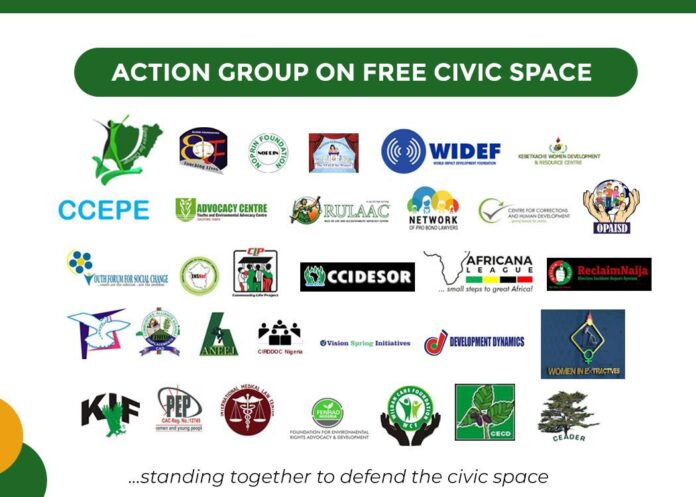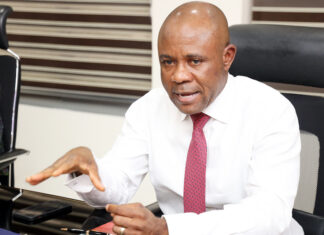National Security has become a weapon use by the Nigerian government to crush dissent, says AGFCS
By Ishaya Ibrahim, News Editor
A study of Nigeria’s civic space has found that National Security has become a weapon use by the Nigerian government to crush dissent.
The study, which was conducted by the Action Group on Free Civic Space (AGFCS), warned against the use of government security architecture to curtail civic freedom. It also advocates balancing between National Security and civic freedom.
AGFCS report was the last of the three-part joint action research titled: ‘Nigeria:Shrinking Civic Space in the Name of Security.’
READ ALSO
New malware steals bank login data, NCC warns
The report examines the popular use of the National Security architecture to limit civil society and disable the environment for active civic participation In Nigeria.
The report, which was presented yesterday, also sought to answer the question: “How can states (like Nigeria) facing multiple security challenges protect civic freedoms while combating violent security threats such as terrorism and violent extremism?”
A statement after the launch list some of the national security threats Nigeria faces to include terrorism, and violent extremism, armed banditry, kidnapping, militancy and separatist agitations, pastoralists-farmers conflicts, transnational organized crime, piracy and sea robbery, porous borders and cyber crimes.
“Among this array of theeats, terrorism and violent extremism rank high on the risk scale and have indeed,received the lion share of attention in terms of strategy, funding and media attention,” the report noted.
The report added that in the name of curbing insecurity, law enforcement powers have been expanded, a litany of security laws have been introduced, meanings of existing laws have been broadened to impute serious crimes with heavier penalties while physical and digital surveillance have become routine.
“From this expansion of policing powers springs an overflow of intended and unintended consequences of law enforcement such as a surge in arrests and detention, use of deadly force to disperse civil demonstrations,censorship of free speech, internet restrictions, proscription of religious and ethnic agitators, designation of dissenters as terrorist groups and so forth. In fact, the legion of security initiatives implemented across the country has increased opportunities for state security agents to misuse and crack down on civil liberties and fundamental freedoms. All these have been justified by referencing protecting national security,” the report states.
According to the study, numerous case studies and documentation in the report demonstrate that fighting terrorism is the most popular justification advanced for the surging restrictions on the activities of civil society actors such as non-governmental organisations (NGOs),humanitarian organisations, political opponents and activists demanding accountability from the government for its human rights failings.
The statement adds: “This research reveals a systematic pattern of exercising overbearing governmental power in ways that tighten the traditional and digitalized spaces for civic engagement in Nigeria.Citizens, especially civil society actors, operating in this type of environment feel repressed and find it increasingly difficult to organize, speak and assemble freely.The report concludes with recommendations that offer civil society actors the levers to push back against the continuing misuse of the security paradigm to curtail civic space.”
The AGFCS calls for collaborative efforts from the government, international community, private sector, media, and civil society to strike the much needed balance between national interests like terrorism and money laundering and the freedom of the civic space in the country.
The group offered some regulations they include.
” I. Categorical declarations from the courts to define the limits of the state’s ability to invoke Section 45 of the 1999 Constitution. Its high time the courts stepped in to clarify the exceptional circumstances when derogations from constitutional guarantees can be lawfully invoked by the government or its agencies especially when invoked in the name of national security.
“II. We highly recommend constructive engagements between civil society and state actors to improve public understanding of the third sector’s contributions to national development.
From all indications, state actors fear that CSOs may be hijacked to perpetrate criminal acts in Nigeria. It is therefore necessary to reassure the government that CSOs are taking all necessary precautions to protect their integrity.This can be properly addressed through self-regulation for CSOs.
“III. Counter terrorism policies and strategies in Nigeria are usually handed down to the country from international rule-making bodies such as the FATF and the UN organs. Engaging these bodies at the policy formulation stage can help ensure that the consequences of the policies in local contexts are adequately considered.”











